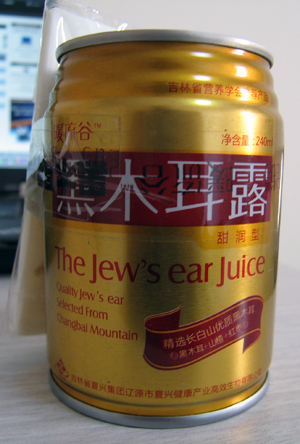The New York Times is running a fascinating and entertaining article today on Chinglish, the uniquely Chinese mangling of English, particularly as it pertains to signs in Shanghai. I love reading about this stuff, and when I lived in San Francisco I regularly enjoyed not only Chinglish, but also Ingrish, the uniquely Japanese mangling of English. The fun comes from speculating about the nature of the menu item “fried enema”. The challenge comes from trying to figure out how it got rendered that way, and what the mangling tells you about a foreign language and the way its speakers think.
But all of this is really just an excuse to post this photo of an item mentioned in the article:
I’m extremely proud to report that I correctly guessed that this must relate to some hilariously named root, leaf, or fungus. From what I can tell, “Jew’s ear” is another word for “wood ear”.
For the record, I’m not making fun. In part because my son wears a shirt with Japanese on it that I have no idea how to translate. (It’s a cartoon, and I just hope it’s not anime porn.) In part because I well remember all the Chinese and faux Chinese my cohort sported during the cringe-worthy Karate Kid era.
But mostly I’m not mocking because sometimes Chinglish results in a lyrical re-imagining of the mundane. If I had my druthers, I’d much rather come across a sign reading this:
Little Grass is Sleeping
than this:
Keep off the Grass
Wouldn’t you?
